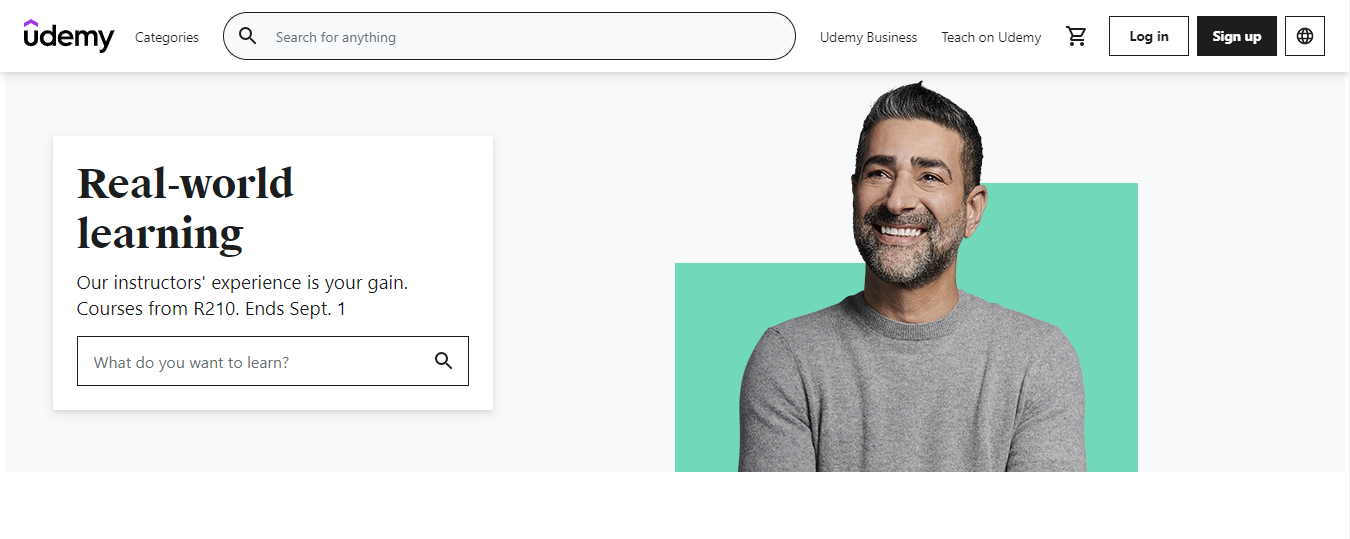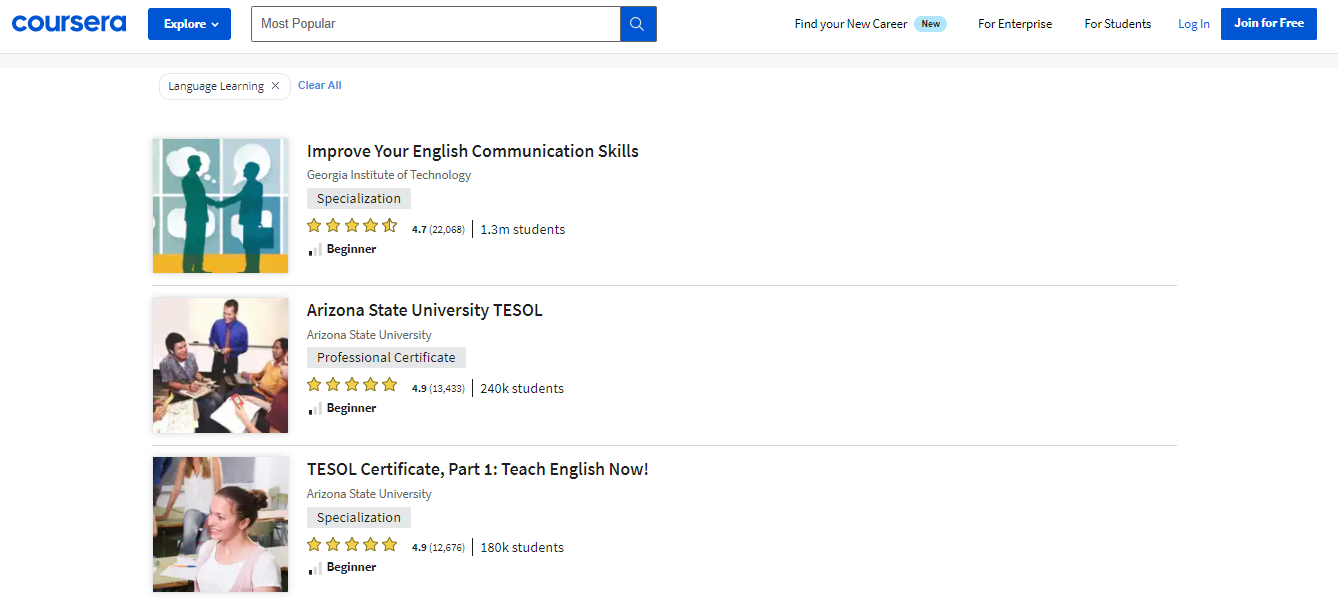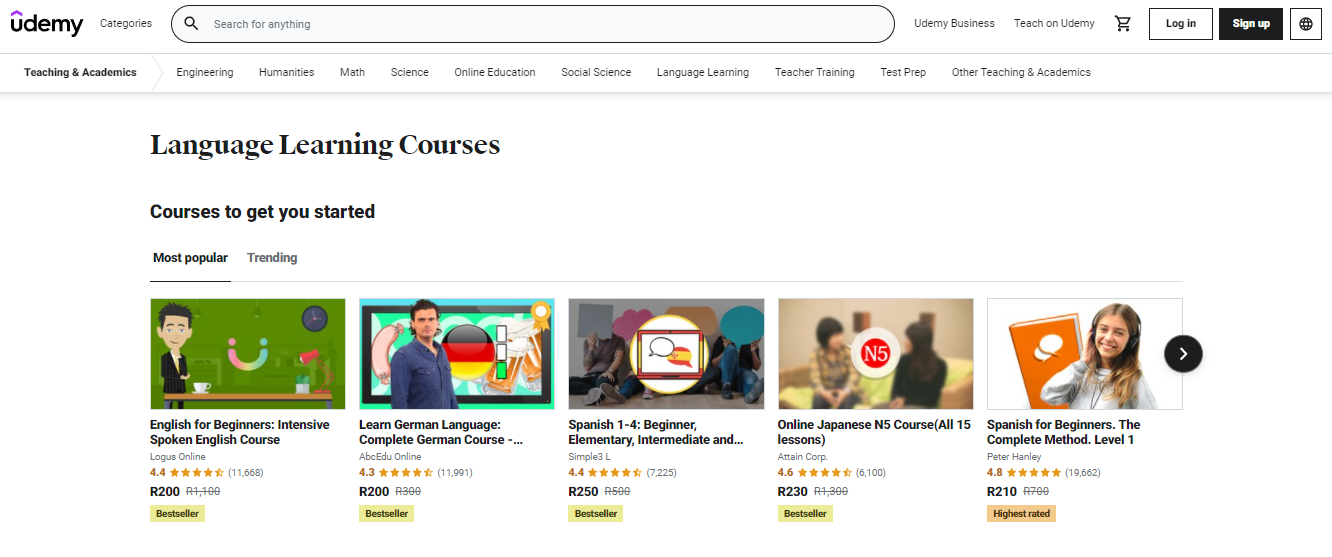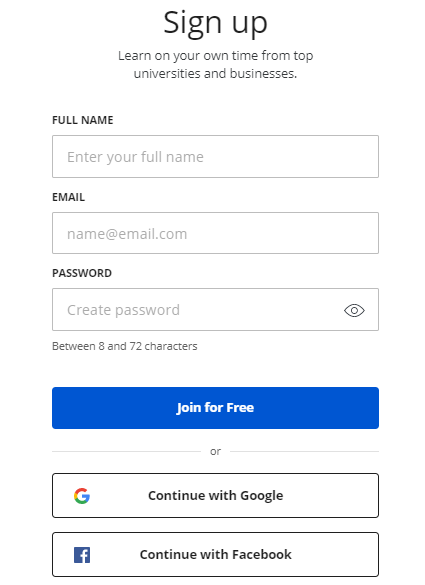Table of Contents
Coursera vs Udemy: An Overview
Anyone who prefers to learn online has heard of Coursera and Udemy. Millions of learners praise these two platforms for their simplicity, high-quality courses, and the wide range of subjects they cover.
Coursera is known for its highly-specialized courses curated by university professors and industry experts. Udemy, on the other hand, is renowned for being affordable and having one of the widest selections of short online courses.
In this Coursera vs Udemy review we dive a little deeper to help you decide where you should start your part-time learning journey.
Coursera vs Udemy: A Quick Comparison
| Coursera | Udemy | |
| Types of Courses | Short & In-Depth Courses | Short Courses |
| Price Range | $9.99 – $50,000 | $10 – $199 |
| Sign-Up Cost | Free | Free |
| Accredited? | Yes | No |
| Self-Paced? | Sometimes | Yes |
Coursera vs Udemy: Who Is It For?
Coursera
Coursera partners with top organizations and universities from around the globe to bring you a wide selection of courses across various topics. If you are searching for courses that will leave you with college credits or an accredited qualification, Coursera is a great choice.

With that being said, this platform is also suitable for working professionals looking to acquire new skills that will help them boost their careers. General Coursera certificates are recognized by employers across the globe.
Udemy
The sheer variety of courses is one of the first things that makes Udemy stand out. The platform is excellent for those looking to improve their existing skills or explore a brand new skill that they might want to take further.

Udemy is also an excellent match for learners on a budget. Even though their courses can cost up to $200, there are frequent sales where you can buy a high-quality course for as little as $20.
However, those looking for a subscription model platform are better off with Udemy alternatives such as Coursera or edX. It should also be noted that Udemy isn’t an accredited institution.
Coursera vs Udemy: Types of Courses Offered
Coursera
Coursera courses are divided into 11 categories:
- Business
- Data Science
- Computer Science
- Personal Development
- Language Learning
- Information Technology
- Health
- Social Sciences
- Math and Logic
- Art and Humanities
- Physical Science and Engineering
There are dozens of subcategories for each category too. In total, Coursera hosts almost 4,000 courses, including degrees and specializations.

Here are the types of qualifications you can pursue on Coursera:
- Guided projects: Short, interactive courses taught by experts. They can mostly be completed in less than two hours.
- Specializations: Available for those who want to master a particular skill.
- Professional certificates: Training programs that prepare you for a job in a specific industry. Some of these programs are even recognized by schools and organizations.
- Master Track certificates: Modules of master’s degree programs serving as credits towards a degree.
- Degrees: From partner universities such as Yale or Princeton. Learners can obtain Master’s and Bachelor’s Degrees.
The popular Coursera Plus plan grants unlimited access to the majority of courses available on the platform. You can enroll in as many courses as you like and earn the course certificate for each. This plan doesn’t support classes from the Degrees and MasterTrack programs.
Coursera also has plans for businesses, enterprises, and large organizations. The perks include unlimited access to the courses, user analytics, skill metrics, and more.
And if you are wondering whether Coursera is accredited, the answer is yes. Many of Coursera’s courses come from accredited institutions and count towards college credit.
However, a Coursera certificate you obtain upon completing their Graded Project or Specialization program is not accredited.
Udemy
Udemy has over 250,000 courses on just about any subject imaginable, so it’s easy to feel overwhelmed while browsing your options.
The platform has categorized its courses into 13 sections:
- Development
- Business
- Finance and Accounting
- IT and Software
- Office Productivity
- Personal Development
- Design
- Marketing
- Lifestyle
- Photography and Video
- Health and Fitness
- Music
- Teaching and Academics
As you can see, Udemy has two additional categories compared to Coursera, but they both offer similar content. Udemy also has a robust filtering system that lets you browse for courses based on duration, level, language, price, or even student feedback.

There are 600 free courses available on Udemy. To find them, just head over to the free resource section. Most of the free lessons are centered around programming languages, web development, and animation. They clock in from half an hour to five hours, and they don’t come with a certificate upon completion.
What about Udemy, is it accredited?
Unfortunatley, Udemy isn’t an accredited educational institution. The Udemy certificate received upon course completion doesn’t count towards college credit and is not recognized by higher education institutions and organizations.
Coursera vs Udemy: Pricing & Refunds
Coursera
Coursera prices vary from course to course. There’s a huge number of learning programs, each with its own price range. The regular classes and guided projects start at $9.99, and the online degrees can cost up to $50,000.
There are almost 2,000 completely free Coursera courses across all 11 categories and you can purchase any free course to earn a certificate upon completion.
The annual payment for Coursera Plus is $399. There’s also a monthly option available at $59. Both options have a free 7-day trial. This option is worth considering for those who want to try different courses.
Specializations start at $39 per month and take up to three months to complete. These Coursera courses also come with a seven-day trial.
The Professional Certificates are from $39 per month and take up to six months to complete.
MasterTrack Certificates from Coursera cost from $2,000 and take four to seven months to complete. The goal here is to get a university-issued certificate and credits.
Bachelor’s and Master’s degrees start at $9,000 and take from two to four years to complete. Plus, you can choose from the world’s most renowned universities like the University of London, Penn, and others.
Coursera’s refund policy is different for each course type. For Specialization courses and Coursera Plus subscriptions, there are refunds available within 14 days after the initial payment.
For Specialization subscriptions, there are no refunds available for payments completed after the free trial. Users can cancel their subscriptions instead. Also, no refunds are available for the Guided Projects.
Udemy
Udemy is one of the rare MOOC platforms that doesn’t offer a subscription service. Instead, you pay per course. You can consider it as an open marketplace for online courses. Everyone is free to create their own course and make money from it. Instructors teaching more complex subjects and offering longer courses set a higher price. Therefore, the prices range from $10 to $199.
You may be surprised to find Udemy offers 90% discounts on their courses from time to time. This is a part of their strategy to have millions of students join a class, compared to a few students learning at higher prices.
When you land on Udemy’s website for the first time, you may even ask yourself, “Is Udemy Legit?” on account of these surreal discounts. However, it’s just the company’s way of doing business. For some courses, we may never know if they actually cost their full price.
All Udemy courses require a one-off payment with lifetime access. When you finish the course, you can always come back to check on the notes or resources.
As for the refunds, Udemy has an excellent policy. Users can have their money back within 30 days of the purchase for any course. You can request a refund easily through the web or smartphone app, and the funds will be returned to you in the original form of payment.
The only exception to the refund policy is if you’ve already completed the course within 30 days. Also, if the system registers too many refunds on your behalf, your account may be suspended. So it’s best not to abuse the generous policy and shop responsibly.
Coursera vs Udemy: Enrolment & Usability
Coursera
Having a well-organized interface can make a huge difference to how you perceive a platform, regardless of the content quality.
Coursera makes the registration process fairly simple. You need to enter your name, email address, and password, and click on the Join for Free button. You can also log in with your Facebook account.

The platform is highly intuitive, making it a breeze to search for new courses. You can even go through the list of Coursera partners to learn more about their specific courses.
Each course is described in detail, so learners know right from the start whether the course comes in a beginner, intermediate, or advanced level. Also, the course duration, timeline, and certificate information are clearly stated for every option.
As learners progress with their video lessons during the course, the system automatically marks them as complete. Details like these make it really straightforward to navigate every course, making online learning an enjoyable experience.
Udemy
Much like Coursera, Udemy makes it super easy to complete the registration process. You just have to add your email, name, and password, and you’re good to go. Once you’re in, you’ll notice a straightforward and clear interface. It’s easy to look for Udemy online courses by categories, subcategories, or popular topics.

The homepage can also provide you with some course recommendations based on your answers to a few questions. You’ll find this feature handy the first time you get lost in the pool of content available on the website.
Potential learners can get information about each course from the description. You can always see the course price, content by sections, requirements, and student feedback. But since Udemy courses are self-paced, there is often no information on course duration.
Coursera vs Udemy: Course Structure
Coursera
Coursera courses come in the form of online classes, starting and finishing on specific dates. It’s highly recommended that you stick to the timeline because you get to participate in a discussion forum where you can connect with the course professors.

Courses are generally made up of a variety of learning mediums:
- Video lectures. Video lectures are short, pre-recorded videos, with most being under 10 minutes.
- Quizzes. Quizzes often appear inbetween the video lectures to assess the student’s progress.
- Projects. Assignments on Coursera are both auto-graded and peer-reviewed.
- Discussions. Forum discussions are very common on Coursera. Learners get to chat with their classmates and professors, ask for help, or turn in assignments.
- Downloadable resources. Plenty of reading material is available for download, so learners have access to their lesson content offline as well.
Students can follow the lessons and complete assignments using the Coursera website or app.
Udemy
Udemy courses are also made up of different learning mediums:
- Video lectures. These are pre-recorded short videos, typically a few minutes long. A lesson usually consists of a series of connected video lectures. Learners can view the lectures on the app, computer, or even on their smart TVs.
- Quizzes. Quizzes appear during the video lectures and serve to assess the learner’s progress.
- Tasks. Depending on the course type, the projects can include single-day or multiple-day tasks.
- Downloadable material. Learners can go over their lessons offline with tons of downloadable resources available.

Udemy courses are on-demand, so learners can work through the course at their own pace. The course syllabus is broken into days, but this is more of a suggestion rather than a requirement to follow.
Students can follow the lessons and complete projects using the Udemy website or app. Also, all Udemy courses come with lifetime access, so learners can come back to them whenever they want.
The Verdict
Both Udemy and Coursera are some of the world’s most popular online learning platforms. However, there are some key differences. Udemy is more focused on teaching new skills, while Coursera offers that and more.
If you’re after in-depth knowledge on a particular topic that you want to crown with an accredited certificate, Coursera is a better fit for you. If you’re looking to learn a new skill without cashing out hundreds of dollars, you’ll be good with both Udemy and Coursera. Also, Udemy is better for learners who prefer to learn at their own pace. Coursera, on the flip side, is a better option for those looking for a traditional classroom learning experience.
